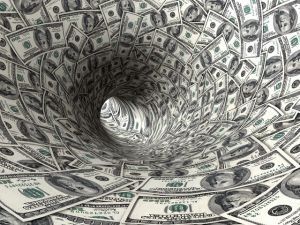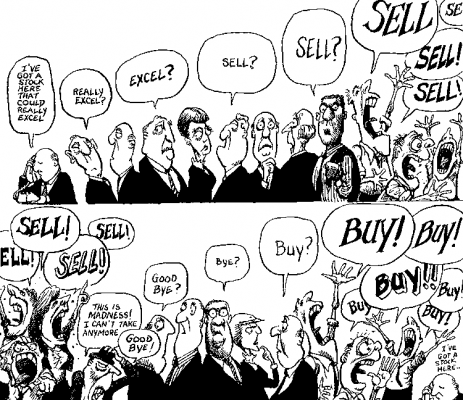
There is something in the deep structure of nature that prevents, or possibly cancels out, quantum effects in macroscopic objects. We don't know what that thing is: some suppose gravitation to be the answer (I am among those); some, the mounting impossibility, as the atoms add up, of sufficiently isolating a system from any information-bearing interaction with its environment. Information, even that contained in a simple thermal bath, spoils the requisite epistemological ambiguity, collapsing waves from probabilities into particles.
We don't yet know how large an object can be made to perform quantum behaviors. Just before the turn of the century Anton Zeilinger did it with buckyballs, weighing in at almost 100 atoms; when I spoke to Keith Schwab in 2007 he was in the midst of an FQXi-supported experiment on creating a ten-billion atom structure that could perform quantum feats of bilocation. And the objects just keep getting bigger.
At some point, nonetheless--the limits of our ability to super-cool systems, some non-linearity inherent in QM itself--quantum effects disappear, and the classical world takes over.
However.
It occurs to me that, while some sort of classical-quantum limit exists for objects with mass, nothing suggests that limit need apply to what we might call "conceptual objects." I'm making up the vocabulary here on the fly, but follow my thought. By "conceptual object" I just mean a large-scale integrated system which is emergent from a whole host of smaller, physical objects, but is not itself a physical thing.
Granted, this sounds like Chopraese woo-woo, but what I have in mind is actually quite commonplace. An everyday example of a conceptual object might be, say, the Amtrak Timetable. The Timetable is the relationship among all the Amtrak trains in time and space. It isn't anywhere, as it isn't a physical thing, like a train or a platform. Still, we use the conceptual object "Timetable" with no difficulty (except for that irritatingly small print).
This would be a conceptual object of a dull sort. Now, what about something more interesting--what about the Stock Market?
What we mean by the term is relatively unambiguous, though nowhere near as easy to pin down as what we mean by "Amtrak Timetable." But like any system, the Stock Market made up of numerous discrete entities, no one of which is determinative of the whole. The Stock Market itself doesn't exist anywhere: it's a conceptual object that emerges as a result of the changing relationships among millions, or billions, of data points. For the purpose of discussion we can regard these data points as physical objects--say, Euros--or as events--say, buy/sell orders. Depending on our pecuniary savvy, we might quibble over whether financial instruments are composed of smaller financial instruments; what the actual "atom" of the market consists of; and the like. For the moment, set those distinctions aside. However we define "Stock Market," when we lament its fall over a copy of the Wall Street Journal in the morning, we're trying to understand the behavior exhibited by a conceptual object, something nonlocal and nonphysical that emerges as the result of lots of little physicals.
But there's a critical difference between the kind of conceptual object that emerges from the relationship among trains and the one that emerges from the relationship among transactions. The difference is that knowing what time train A arrives, by looking in the Timetable, is irrelevant to what time train A arrives. Trains aren't connected to knowledge.

Not so with the Market. (If you see where this is going, move to the head of the class.) Wiz-kids have been trying for generations to predict Market fluctuations based on mathematical models. So far, success has been limited, which is polite. New claims about unexpected keys to Market analysis seem to be forever popping up, from hens to hemlines. Still, you may have noticed that nobody, from your neighbor with his surefire investment tip to the fancy suits who work at brokerages, was saying to you on May 5th of this year: "Pull out! Pull out now! It's all going south tomorrow!" The pros had no more idea what caused the 1000-point "flash crash" than the shmoes.
By the way, there is a (silly, I'm afraid) movie called "Pi" that came out a decade or so ago about just this modern epistemological quest. Math genius is recruited by Wall Street firm, or its shady equivalent, to figure out the deep pattern in stock market fluctuations and allow reliable prediction. Turns out he's actually on the trail of the secret name of God. (I told you it was silly.)
Well, past performance does not indicate future behavior, as they say. There's an element of uncertainty in Market behavior, and it may be inherent in the system, allowing us to glean an average trend across years or decades but not individual events. Should that sound at all familiar?
Second point: the behavior of the Market changes based on what people know--specifically what they know about the Market's behavior. There is a self-referential quality that has something to do with information. Macro-Economists are left saying such strange things as: "If we could just get consumer confidence back, the Market would rebound." Which really does mean: if we believed the Market were strong, it would be strong--not by magic, but because the behavior of individual data-points responds to information about what all the other data points are doing.
This sounds suspiciously like a quantum phenomenon. If nobody looks--say, when a great many are buying on margin--there's no problem using money that doesn't actually (read: classically) exist. The Market is in a wave state: robust, even absurdly extended, so long as no one asks exactly where the money is right now. Trading can go at a much higher volume than is "possible." A margin call is the equivalent of collapsing the wavefunction: that is, have some information-bearing interaction break into the Market, and suddenly all that money has to be somewhere. And if yours isn't there, I have to say whether mine is there or not. And so does the guy who borrowed from me.
It's probably just a metaphor. But what if it's more than that? Physics has been crossing steadily over into epistemology since Copenhagen. We routinely discuss nature in terms of information; we utilize observation, and the absence of observation, as tools in getting nature to do things that are classically outlawed. Well, trading volumes that are higher than the amount of money "really" changing hands are classically unreal, but these bubbles seem to occur in the conceptual object nonetheless, work their wonders, and then collapse again as a result of information escaping.
Might we use what we know about quantum behaviors, and our burgeoning knowledge of how to maintain them in macroscopic environments, finally to understand how the Market itself operates?
